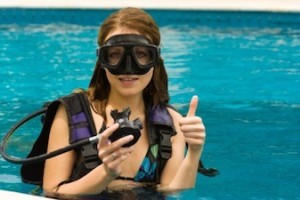Scuba Diving for Kids – What You Should Know about It
 Although it̵7;s not usually written as such, ̶0;scuba̶1; is actually an acronym. It stands for Self Contained Underwater Breathing Apparatus, which sets it apart from snorkeling. Snorkeling involves special equipment, too, but it comes down to using a tube to breathe natural air from under the water.
Although it̵7;s not usually written as such, ̶0;scuba̶1; is actually an acronym. It stands for Self Contained Underwater Breathing Apparatus, which sets it apart from snorkeling. Snorkeling involves special equipment, too, but it comes down to using a tube to breathe natural air from under the water.
Scuba diving is different. Scuba divers carry their air in tanks with them under the water. Some scuba classes begin with snorkeling as means of introduction to scuba diving. It̵7;s important for parents and caregivers to understand the difference between these two terms before deciding on what water activity they choose for their kids.
Safety
With some companies advertising scuba classes for kids as young as 5, you might find yourself concerned about safety. This is understandable, and professionals share your concern to the point that certification is required for any scuba diver. There are various diving societies, and adults and kids who wish to participate in scuba diving must be certified by one of these societies. Safety concerns are best addressed by choosing the right school and instructor.
Instruction ̵1; What to Look For
When you are searching for scuba instruction for your kids, there are some things to keep in mind. Here are some tips.
1. The total package ̵1; A good scuba instruction school will not skimp on necessary equipment and personnel. As you̵7;re shopping around, ask various schools what their price includes. If the cost is very inexpensive, ask them what is included in the package. It should include equipment, informational literature, materials for training, and certification. Also find out how many classes are included in the price.
2. Experience ̵1; Find out how long the instructor has been teaching scuba to children, and what his or her certification is. It̵7;s also not a bad idea to find out how long the school has been around. If it̵7;s many years, it probably has a good reputation. Sources recommend at least 1 year of experience in an instructor, and 25 certifications given by him or her.
3. How many kids? ̵1; The number of kids in the class per instructor can make a difference in how well your child learns the skills and scuba safely. It is not so much how many kids are participating in total, but what the student-to-instructor ratio is that̵7;s important. If there are multiple instructors, you might want to ask about each one̵7;s experience, too.
4. Personality ̵1; It̵7;s important to like the instructor and see him or her as a good fit for your kids. Even if an instructor has all the qualifications, if you don̵7;t like him or her, it̵7;s not necessarily going to be a good experience. Choose someone whose teaching style fits your kids. An instructor should be patient, clear and easy to hear, and enthusiastic.
Helpful Links:
Physiological risk factors for pre-teen divers?
PADI ̵1; Scuba Lessongs for Children
-
Fear in children is a response to an unpleasant feeling perceived as a threat. Parents often teach children to be fearful and cautious of specific dangers such as deep water or fire. Here, fear acts as a positive emotion that helps keep children safe
-
It’s no secret that most kids would love to have their very own battery operated vehicle. If you are considering buying a battery operated truck for your child, there are many different manufacturers and models you can choose from. Whether it i
-
Although the phrase “It’s never too early to start,” might not apply to exercise for toddlers, exercise is an important part of life for children as young as early childhood. Around the age at which schools are allowing children to


